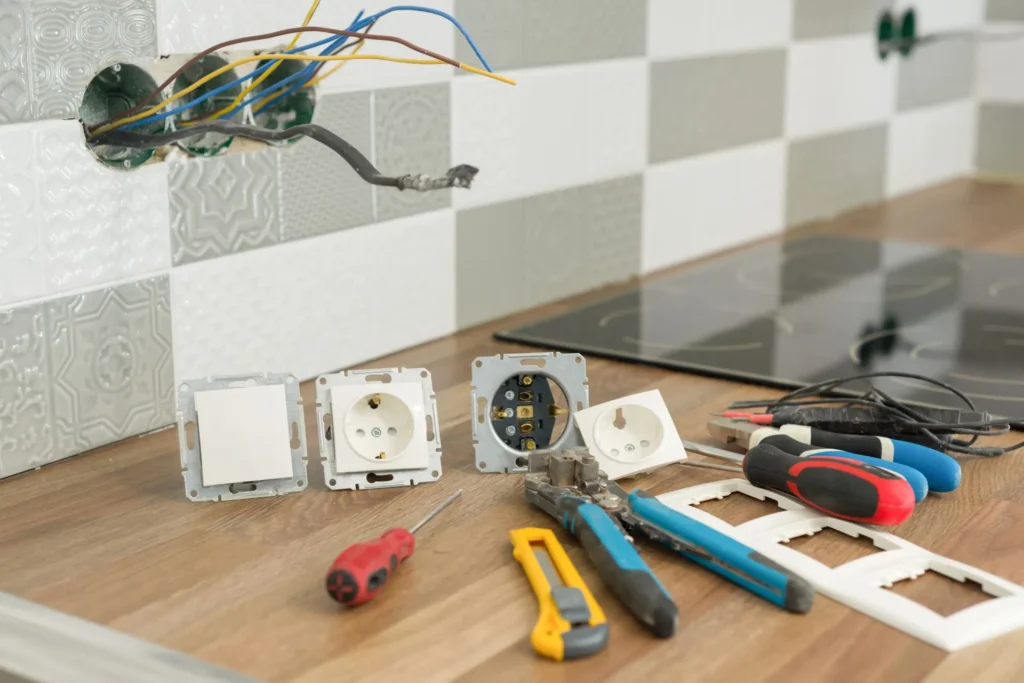
Electricity is the lifeline of any modern home, powering everything from lights to appliances, entertainment systems, and essential safety devices. Keeping your home’s electrical system in top shape is key to ensuring comfort, safety, and energy efficiency. This blog will guide you through essential home electrical services, maintenance tips, and how to tackle common issues.


1. Electrical Repair & Maintenance
Regular maintenance and timely repairs are crucial to keeping your electrical system safe and functional. Loose wiring, frequent circuit trips, or flickering lights can be indicators of an underlying problem. Here are some common services to consider:
- Preventive Maintenance: Regular inspections by a licensed electrician can catch minor issues before they become major repairs.
- Emergency Repairs: For issues like power outages, short circuits, or sparking outlets, an emergency call to a professional ensures quick and safe fixes.
2. Wiring Services
Wiring is foundational to any electrical system and plays a critical role in its safety and performance. Whether you’re building a new home or renovating an older one, upgrading the wiring is essential.
- New Home Wiring: Ensure your new build is wired for today’s technology, with considerations for smart home compatibility and ample outlets.
- Rewiring for Older Homes: Older wiring, such as aluminum or knob-and-tube, can pose a fire hazard. Upgrading to modern wiring keeps your home safe and able to support modern energy demands.
3. MCB, Sub-Panels & Meter Installation
For efficient power distribution and enhanced safety, MCBs (Miniature Circuit Breakers), sub-panels, and updated metering are essential in homes with growing electrical needs.
- Circuit Breaker Upgrades: Replacing old fuses with MCBs provides better control and faster power restoration in case of overloads.
- Sub-Panels: A sub-panel can prevent overloading the main panel by distributing electricity more evenly across rooms or areas.
- Smart Meter Installation: Newer, digital meters help track energy usage more accurately and may even allow for remote monitoring, helping to reduce your energy bills.
4. UPS and Inverter Installation
In regions with frequent power cuts or for homes with critical equipment, UPS (Uninterrupted Power Supply) and inverter installations provide reliable backup solutions.
- Power Continuity: UPS systems are ideal for keeping electronics like computers and security systems running during brief outages.
- Inverters for Extended Power: Inverters can keep your lights, fans, and some appliances running for longer periods, making them essential in areas with unreliable electricity.
5. Specialized Electrical Services
Advanced electrical services cater to modern lifestyle needs, from ambiance-enhancing lighting solutions to eco-friendly electric vehicle (EV) charging.
- Lighting Design and Installation: A well-planned lighting design can transform your home, with task lighting for kitchens, ambient lighting for living spaces, and accent lighting for special decor.
- EV Charging Station Installation: As more households switch to electric vehicles, home charging stations are becoming increasingly essential. Installing a dedicated charging port ensures your EV charges safely and efficiently.
6. Energy-Efficient Upgrades
Saving energy not only lowers bills but also benefits the environment. Consider these upgrades for a more sustainable home:
- LED Lighting: Replacing incandescent bulbs with LED lighting is one of the easiest ways to cut down on electricity usage.
- Smart Thermostats & Outlets: Automate your home’s heating, cooling, and power use to match your lifestyle, saving energy and improving convenience.
7. Safety Tips for Electrical Systems
Ensuring your home’s electrical safety doesn’t stop with installation. Here are essential tips to keep your system safe and well-maintained:
- Regular Inspections: Annual checks can spot issues before they become serious.
- Avoid Overloading Outlets: Too many devices on a single outlet can cause overheating and increase fire risk.
- Install GFCI Outlets: Ground Fault Circuit Interrupters (GFCIs) are essential in wet areas like bathrooms and kitchens, cutting power immediately in case of faults.
8. Professional vs. DIY Electrical Work
Small fixes, like changing a light bulb or resetting a circuit breaker, can be done safely at home. However, more complex tasks, such as rewiring, breaker installation, and troubleshooting faulty outlets, should be left to a licensed electrician. Attempting DIY electrical work without proper knowledge can lead to safety hazards.
